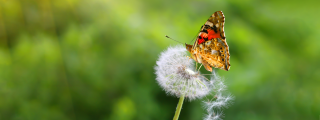Lecture Series History: 2020

In 2020, the Natural History Museum of Utah's annual Lecture Series explored the Essence of Nature. Read on to learn more about the theme and speakers.
About the 2020 Lecture Series
In a world where more people live in urban settings than rural communities, where do we find nature? Can we experience it only in those remote places untouched by humans? Or is nature all around us? Listening for the unexpected and seeing with fresh eyes can begin to blur the lines between city and nature and reveal the surprising world that surrounds us every day.
2020 Speakers
Shankar Vedantam & Florence Williams
The Nature Fix: Why Nature Makes Us Happier, Healthier, and More Creative
Shanker Vedantam, host of NPR's Hidden Brain, interviews prize-winning author Florence Williams about the restorative power of nature. For centuries, poets and philosophers extolled the benefits of a walk in the woods: Beethoven drew inspiration from rocks and trees, and Nikola Tesla conceived the electric motor while visiting a park. Intrigued by our storied renewal in the natural world, Williams sets out to uncover the best science behind nature's positive effects on the brain. As our modern lives shift dramatically indoors, Williams will explain how the natural world can improve health, promote reflection and innovation, and ultimately strengthen our relationships. From forest trails in Korea, to islands in Finland, to groves of eucalyptus in California, Williams' keen observations - and the answers they yield - are more urgent now than ever. Join us for a book signing by Williams and Vedantam following the lecture.
John Marzluff
Welcome to Subirdia
Author of five books, Marzluff's 2014 Welcome to Subirdia uncovered a surprising discovery-suburbs of many large cities support incredible biological diversity. Our cities and towns see the effects of human development. Runoff pollutes our streams. Homes and businesses encroach on wilderness habitat. Energy use warms the planet and too many species are in decline. Yet for some of our most charismatic wild creatures, suburban and urban habitats offer surprising opportunities to thrive. Just as we affect the birds around us, they shape our culture, commerce, and quality of life. When we make an effort to enhance bird habitat in our cities and towns, we cultivate communities that value nature, are attractive and exciting places to live and work, and improve mental and physical health of our neighbors. Join us for a book signing following Dr.Marzluff's lecture.
Emma Marris
What is "Nature" in a Changing World?
Humans have altered the Earth for thousands of years, and climate change means every inch has been changed. What counts as nature in this changing world? What does it mean to protect it? And how can we humans have a good relationship with the nonhuman world? Marris writes for National Geographic, Wired, The New York Times, Nature, and others. In her book, Rambunctious Garden: Saving Nature in a Post-Wild World, she focuses on innovative ways to conserve biodiversity in a humanized world. Marris' insightful writing about how we define "nature" and why it matters inspired many of the stories in NHMU's special exhibition, Nature All Around Us. She is even featured in the exhibition in an original video championing the idea that nature is almost everywhere and inseparable from humans. Listen as she challenges our ideas about nature, and urges hope and action in the face of an uncertain future. Join us for a book signing following the Feb 4 Lecture at NHMU.
Nalini Nadkarni
The Dynamic Nature of Nature: Disturbance, Resilience, and Recovery
Humans often look to nature for balance, stability, and tranquility. But disturbance is an essential element of our systems in nature, society, and human lives. The dynamics of disruption and subsequent recovery occur at widely ranging scales of time and space. Nadkarni explroes the inherent dynamics of nature through and interdisciplinary lens. What has emerged are elements that facilitate the restoration of disturbances in nature, in human society, and the human body. These insights contirbute to understanding the essence of nature within and outside us. A passionate communicator about nature to people in all walks of life, Nadkarni's innovative science engagement programs have earned her accolades and a swath of awards including a Guggenheim Fellowship, the AAAS Award for public Engagement, the Archie Carr Medal for Conservation, and the William Julius Wilson Award for Achievement in Social Justice.